
19 Oct Anti-Militarist and Anti-Discrimination Activism: How Can We Foster a More Intersectional Discourse?
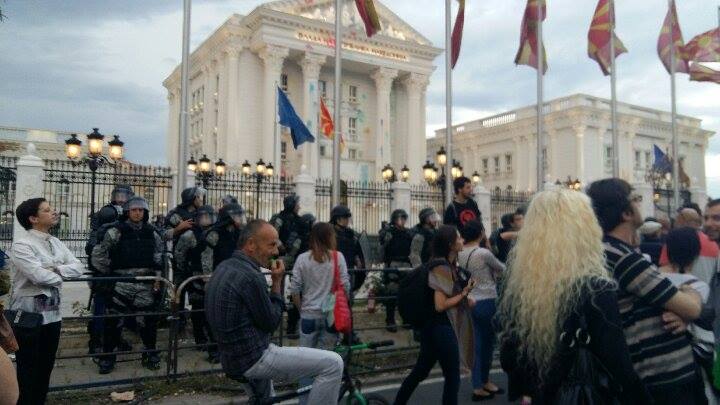
Macedonian police officers armed with riot gear in front of the Macedonian government building during a Colorful Revolution protest commemorating the death of Martin Neskovski. (Credit: Elena Gagovska)
By: Elena Gagovska
“Actually, the military is investing a lot of money into programs for women’s equality,” said one of the participants in a workshop during the “Bridging Backgrounds” conference for Macedonian high schoolers about tolerance, interethnic understanding and human rights that was organised with funding from the Davis Foundation. I couldn’t help but let out a laugh. Given that I was a volunteer at the conference and a co-facilitator of the workshop, this wasn’t the most appropriate thing to do. .
“Sorry for laughing; that’s just not at all the feminism I subscribe to,” I said — not because I thought that the statement he had made was untrue, but because we clearly had two very different feminist visions.
None of the other participants or my co-facilitator were surprised that my views differed from those of the buff, toxically masculine Macedonian teenager with the inexplicable and annoying American accent – we’ll call him Nikola. Being the son of a Macedonian military official, Nikola loves the military as an institution: the organization of it, the (morally questionable) work they do, their values, everything. But, beyond this, Nikola loves the US military in particular. At one point during the conference, outside of the formal educational activities, Nikola proclaimed that it saddened him that, as a non-US citizen, he can not become a marine. It seemed to me that Nikola thought of himself as an American and had the accent to prove it. I have met Americans who don’t question the actions of their country or military, but this was something else. When I asked Nikola if he approved of all of the actions the US military has taken, he said yes. When I asked “Even Yemen?”, he had no idea what I was talking about, completely oblivious to the US backing of the devastating two-year-long conflict that has left the country in ruins. To Nikola, the US military is not something to be questioned, but worshiped and even seen as a ground for progressive politics of female liberation.
I, however, have a different perspective of the military. When I took part in the Macedonian anti-government Colorful Revolution protests, we were unfailingly met with extremely militarized police. Even if the police didn’t attack or arrest protesters at every daily protest, their appearance – guns, shields, riot gear – sent the message that they could if they wanted to. We were not meant to feel safe. On June 6th, 2016, together with my mother and two of her friends, I was a part of a 20 000 people crowd that protested on the five year anniversary of Martin Neshkovski’s*1 murder by a police officer and the government’s attempt to cover up the incident. Feeling the most adrenaline I ever have in my life, I was in the fifth or sixth row of people that pushed through a police barricade near the Skopje government building. To get to justice, we had to push against people that were supposedly protecting us.
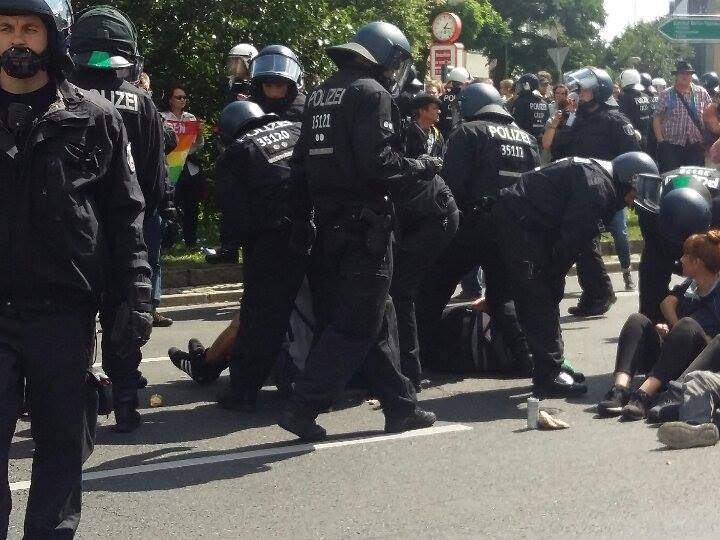
German Police forcefully removing anti-fascist protesters in Spandau, Berlin on 19th of August, 2017. (Credit: Elena Gagovska)
But no, this is not a Macedonia specific kind of thing. Just last weekend, on the 19th of August, together with Julia Damphouse (BA3) and another friend, I attended the “Berlin gegen Nazis” (Berlin Against Nazis) counter protest. It was a response to a Neo-Nazi organized rally to commemorate Nazi politician and Deputy Führer to Adolf Hitler, Rudolf Hess. A rally that celebrates fascism could not have gone without a response from the Left, as that would have sent the message that such political views should be allowed to exist. Thankfully, there wasn’t any violence at the event. However, at one point there were several sit-ins in front of the riot-gear armed police, and their response to this non-violence was violence. Police officers forcefully removed peaceful leftist/anti-fascist protesters while the rest of us booed them. Sadly, I can’t say that I was surprised.
If I hadn’t known it before, on those two protests it was abundantly clear to me that the police is not a progressive force and, by extension, neither is the military. Institutions with systemized hyper-masculinity will never make me feel safe, and they sure as hell aren’t going to pave the way for a feminist revolution — even if female employees of the police and military are somehow considered equal to their male counterparts.
Still, I always thought that it was going to be protesting experiences that would evoke my strongest negative feelings towards any military or police — in a sense this is still true. But somehow the events of July 29th, 2017 provoked similar disdain and outrage as a protest would. Three weeks ago the US and the Macedonian military had a joint public exhibition of military gear, guns and vehicles. On the backdrop of the fountain of Alexander the Great – a monument that is a part of the larger nationalist and masculinist architectural project “Skopje 2014”*2 – the sense of imperialism intensified. But, apparently, not many shared my sense of profound discomfort. Some took enthusiastic photos with the soldiers while others climbed into the military vehicles as if they were a part of a mobile amusement park. Worst of all, little children tried on helmets and held guns like they were playing with harmless toys. Surprisingly, Nikola was not at this event.
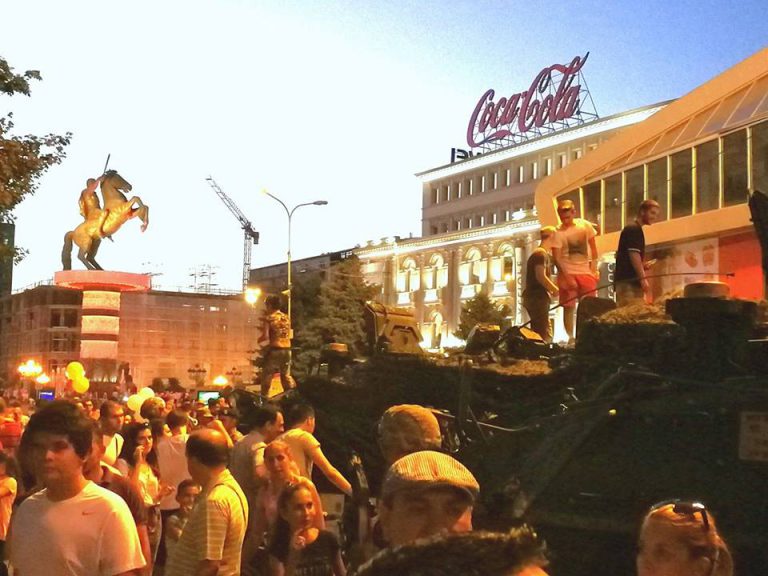
American Military vehicle on the Skopje City Square. (Credit: Borjan Gagovski)
My brother posted the picture above with a caption that pretty much sums up the event: “Alexander the Great, Coca Cola, American tanks. There’s something here: corruption, corporatism, militancy – something something symbolism; not sure what kind, but I think it’s there.”
Still, most Macedonians spoke about this event, which later toured in other Macedonian cities, as a good thing, politically speaking. With the change of government, the Social Democrats who are now in power claim that Macedonia’s future is with NATO and the EU. Most political analysts and solid Twitter commenters interpreted the military exercise as a message from the US that Macedonia would soon become a member of NATO [*3]. For a country as small as ours, this would probably be a good thing as it would distance us from Russian influence and keep stability in the region. But, regardless of what potentially positive message was being sent to the Macedonian government and people, this military exercise still glorified the military as an institution. It presented soldiers as friendly while not addressing that Macedonia has sent troops to help the US military in Afghanistan and Iraq – two wars that have been deemed unjust. Though I would at the very least advocate for taking steps to limit the use of the military to small scale UN-type peacekeeping missions while working on ways to completely reconstruct the military as institution, it is not as if the military will be abolished any time soon. Therefore, the least we can do at the moment is subject the military’s actions and inner workings to continuous rigorous examination for an institution that yields so much power should not go unchallenged. Even under the new Macedonian center-left government, four protesters from “The Left” (Левица) were unjustly detained for holding a banner reading “Against Wars for Profits” at the military exercise in Skopje. Their detention sends the message that anti-War activism and political positions are not welcome, even by a more progressive Macedonian government.
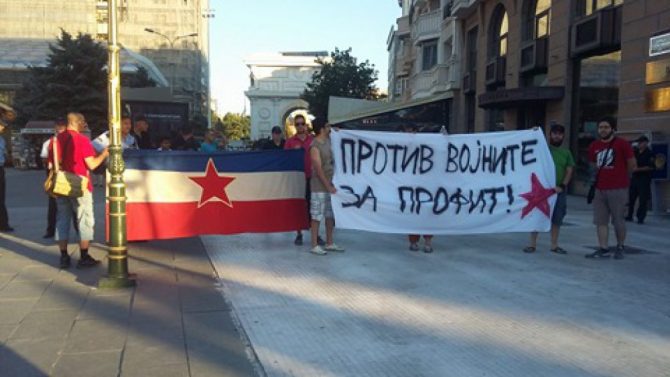
“The Left” (Левица) holding a Yugoslovian Flag and a banner that reads “Against Wars for Profits”. (Credit: www.libertas.mk)
This brings me to why people protest the military. Certainly, military force can be justified in some cases, World War II being one of them. However, anti-war movements have been centered around protesting unnecessary and unjust wars. One such example is the Vietnam War in which the U.S. and its allies supported South Vietnamese anti-communist forces while the Soviet Union and its allies supported North Vietnamese communist forces. This 19 year conflict (1955-1975) devastated the region and was nothing more than a proxy-war of the Cold War Era. This war elicited mass activist mobilization, particularly from students, while also having the intellectual and artistic backing by people such as Allen Ginsberg and Martin Luther King Jr. Another example are the protests that occurred in the wake of the Iraq War (2003-2011): an invasion started on the false pretense of uncovering possible weapons of mass destruction. It is clear from these two examples that, more often than not, the military is a force of destruction and occupation rather than peacekeeping. It is because of this that the Left does and should not consider the military a progressive institution and why it must continue to oppose its unjust actions.
And yet, with all of its flaws, it seems that often the military has been a civil rights battleground. One such example is the desegregation of the US military in 1948. Often a news story will come up about the first female or black or gay member of a certain military branch. So in a sense, Nikola is right that the military can manifest these socially progressive values, and, of course, when discrimination is overcome in any institution, it is a good thing. It is because so many people have a positive view of the military and believe in the equality of all soldiers within it as an institution that there was so much outcry about Donald Trump’s military trans ban.
When I saw the news of this policy change delivered via tweet, I was as shocked as the next person. But what shocked me even more was how this news was handled by a lot of people on the Center-Left/Left. For example, Senator Kamala Harris tweeted “This is discriminatory, and un-American. To the transgender service members who defend our nation, I stand with you.”, implying both that discrimination goes against the American value system and that going to Middle-Eastern countries somehow protects America. Suddenly, leftists glorified military service as being this brave thing a person could do simply because they were defending trans people’s right to do it. It seemed that most of the Internet had reduced this issue to shallow identity politics.
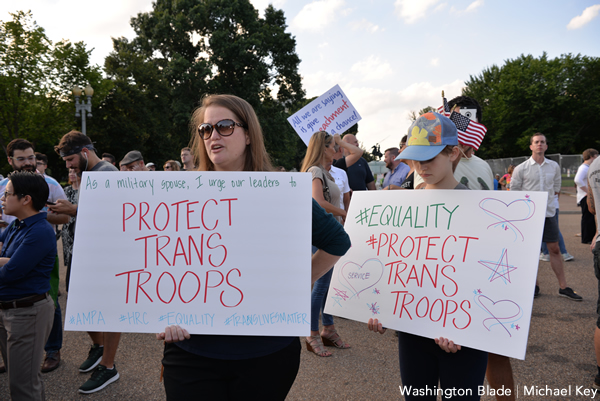
Protesters opposing Donald Trump’s military trans ban in front of the White House. (Credit: Washington Blade.)
Instead, post initial shock, our response to this sudden civil right crisis should have been to acknowledge the complexity of the situation. As we watch in the following months how Trump’s tweet may translate into policy, perhaps it is not too late to adequately respond to the nuanced nature of this on-going issue. Of course, we should condemn Trump for this transphobic, bigoted ban; institutional discrimination should never be tolerated by the Left. But this should be a time when we both denounce the ban and talk about the ways in which the military is oppressive internally as well as to the external world. A starting point can certainly be the question: Why are there as many as 15 500 trans soldiers [*4] in the military in the first place? The trans community is arguably one of the most marginalised communities out there. Trans unemployment and homelessness is staggering due to the unprecedented amount of discrimination they are subjected to. This immense poverty makes them turn to the military for employment. Surely, some do it because they believe in it as an institution, but it is naïve to say that most have this choice.
Since the US military offers healthcare and a college education in exchange for service– things that the most vulnerable groups of society lack – it seems like a good deal. The question to ask here is whether or not the US military would at all be able to sustain its current recruitment numbers if college were free in the US and the wealth gap was smaller? I highly doubt it. By offering these seemingly generous benefits, the US military preys on marginalized groups who lack other options. Professor and trans activist Dean Spade [*5] said the following on the issue:
So when we lose our critique of militarism and of the U.S. military in this debate, what happens, in my view, is that trans people become sort of a symbolic space in which to have basically pro-military advocacy and PR. (…) How can we have a more complex conversation about the fact that, yes, trans people are poor and underemployed and need real jobs, but their option should not be one of the most dangerous and exploitative jobs possible?
With all of this in mind — the common response of police towards protesters, the unjust wars, and discrimination within the military — we must keep our activism smart. Yes, we should critique Trump’s military trans ban, but we should also criticise such actions as his dangerous provocations of North Korea (while remembering to do this in times when the White House is inhabited by a Democrat and right our failure to challenge President Obama’s wars). We should not simply fight for the rights of trans people on this base level discrimination, but fight for economic in addition to social justice of marginalized groups. It is not as if we, as activists, must choose one or the other: trans rights or anti-militarism. Instead, we must tackle these issues together. We should fight discrimination inside the military and the police while understanding that this is not the real path to trans liberation, or the liberation of any other marginalized group.
Notes:
- Martin Neshkovski was a 22-year-old Macedonian who was killed by one of ex-Prime-Minister Nikola Gruevski’s bodyguards in 2011. The VMRO-DPMNE government that was in power at the time tried to cover up his murder. His death incited immediate protests against police brutality in 2011, as well more protests later in 2015 and 2016.
- For those interested, you can find more information about why “Skopje 2014” was such a damaging project in vast detail here: Skopje 2014 Uncovered. (Скопје 2014 под лупа.) http://skopje2014.prizma.birn.eu.com/en
- Murusic, Sinisa Jakov. Macedonia Hosts Joint Military Exercise with US Troops. Balkan Insight. July 28, 2017. http://www.balkaninsight.com/en/article/macedonia-us-attend-joint-military-exercise-07-28-2017
- Greenfied, Rebecca and Tozzi, John. Here’s How Many Trans People Serve in the US Military. Bloomberg. July 26, 2017. https://www.bloomberg.com/news/articles/2017-07-26/here-s-how-many-trans-people-serve-in-the-u-s-military
- What Role Should the Military Play in the Fight for Transgender Rights? Democracy Now! July 27, 2017. https://www.democracynow.org/2017/7/27/what_role_should_the_military_play
